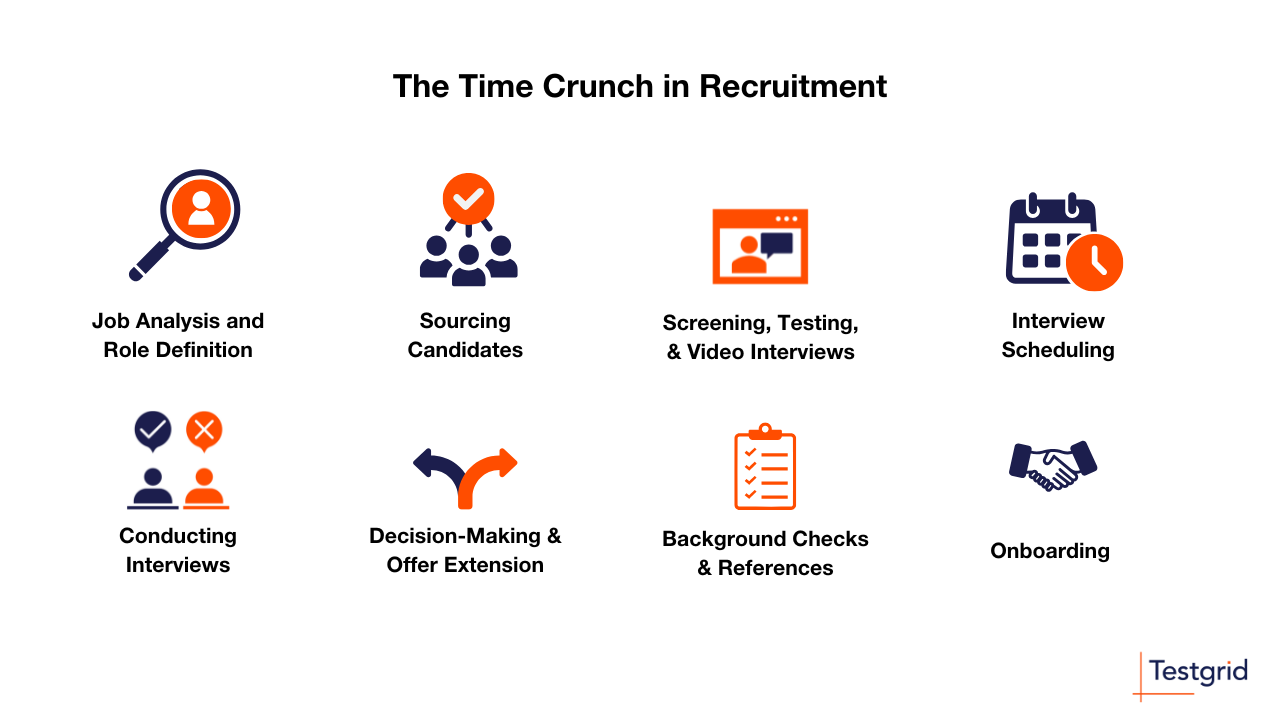The Time Crunch in Recruitment
How Automated Interview Scheduling is Transforming Hiring Efficiency
In today’s competitive job market, organisations strive to attract and retain top talent efficiently. However, the recruitment process often becomes a time-consuming and resource-intensive endeavour. In Australia, the average time to hire an employee has reached an all-time high of 44 days, with the average cost to hire more than doubling from $10,500 in 2020 to $23,860 per worker in 2021. Moreover, a bad hire can cost an employer between 15% and 21% of that employee’s salary, depending on seniority. While organisations aim to reduce recruitment timelines to save costs and secure top talent swiftly, rushing the process can lead to challenges such as inadequate candidate assessment and poor cultural fit. These issues not only affect the quality of hire but also impact Candidate’s Experience (CX), potentially deterring qualified individuals from pursuing opportunities with the company.
This guide explores key stages where time inefficiencies often occur in the recruitment process, highlighting the benefits of using an interview scheduler and other tools to streamline hiring.

Understanding Time Sinks in the Recruitment Process
1. Job Analysis and Role Definition
This initial phase involves thoroughly understanding the requirements of the vacant position. It includes defining job responsibilities, necessary skills, qualifications, and alignment with organisational objectives.
Challenges: Without a clear job definition, candidate searches become misaligned, resulting in longer hiring timelines.
Solution: A standardised process for job analysis ensures clarity and alignment, helping recruiters target the right candidates from the start.
2. Sourcing Candidates
Attracting potential candidates through job boards, social media, and recruitment agencies is a crucial stage in filling a vacancy.
Challenges: Relying solely on traditional methods can limit the talent pool and prolong the search for suitable candidates.
Solution: Expanding sourcing channels to include job boards, social media, and professional networks helps reach a diverse group of candidates and speeds up the process.
3. Screening, Testing, and Video Interviews
Screening evaluates applications, testing assesses skills, and video interviews provide an early opportunity for assessing suitability. An effective interview scheduler can significantly reduce time spent coordinating interviews, making this phase more efficient.
Challenges: Manually reviewing applications and coordinating tests can be labour-intensive. Technical issues during video interviews, such as connectivity problems, can hinder the process.
Solution: Implement Applicant Tracking Systems (ATS) and use an interview scheduler to automate and streamline screenings and video interviews. By providing candidates with clear instructions for the video interview platform, an interview scheduler can help streamline and centralise all scheduling efforts, saving days in the hiring timeline.
4. Interview Scheduling
Coordinating suitable times for interviews between candidates and interviewers is essential for maintaining momentum.
Challenges: Without an interview scheduler, scheduling can become time-consuming, often requiring several back-and-forth emails.
Solution: Adopting an interview scheduler that integrates with calendars reduces manual coordination and allows candidates to choose available slots, cutting down delays and optimising the interview process.
5. Conducting Interviews
This critical stage involves assessing candidates’ fit through interviews, including phone, video, and in-person meetings.
Challenges: Extended interview processes with multiple rounds can deter candidates and lengthen the hiring cycle.
Solution: A structured interview process, supported by an interview scheduler, allows recruiters to limit the number of rounds, maintain evaluation quality, and keep candidates engaged.
6. Decision-Making and Offer Extension
After interviews, the hiring team evaluates candidates to make a selection and extend a job offer.
Challenges: Delays in decision-making and offer extension can lead to lost candidates.
Solution: Establish clear timelines for decision-making and use an interview scheduler to keep candidates engaged with status updates throughout the process.
7. Background Checks and References
Verifying candidates’ qualifications, work history, and background ensures they are fit for the role.
Challenges: Lengthy background checks can delay onboarding.
Solution: Partnering with background check providers who offer efficient turnaround times is essential. Initiating these checks early can help reduce onboarding delays.
8. Onboarding
The final phase integrates the new hire into the organisation with orientation, training, and resources.
Challenges: Disorganised onboarding can lead to confusion, decreased productivity, and higher turnover rates among new hires.
Solution: Providing a structured onboarding experience that includes necessary resources and guidance helps new employees settle quickly and enhances their productivity.
Conclusion
By identifying and addressing these common time sinks, organisations can streamline recruitment, reduce time-to-hire, and improve the overall candidate experience. Implementing tools like an interview scheduler to automate scheduling, adopting technology for screenings, and maintaining open communication are critical steps toward creating an efficient, candidate-friendly hiring process.
Ready to Simplify Your Recruitment Process?
If coordinating interviews is slowing down your hiring, it’s time to streamline with an efficient interview scheduler. Testgrid’s Interview Scheduler can help you reduce delays, minimise back-and-forth, and keep your candidates engaged with seamless scheduling. Get in touch to see how our tool can cut time-to-hire and enhance your recruitment workflow. Reach out today to discover how Testgrid’s Interview Scheduler can make every stage of your hiring process faster and easier.
Get in touch with our team here, or call 03 9040 1700 to learn more. If you want to talk to one of our experts about utilising Testgrid’s Interview Scheduler, get in touch with our team here.
